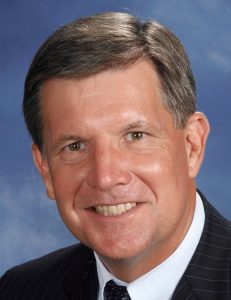Many of us will be privileged to gather on Thanksgiving Day with family and friends to enjoy a bountiful feast and hearty conversations around the table. As one of our treasured holidays, Thanksgiving is a day set aside not only to give thanks, but to rekindle in us a spirit of gratitude.
In 1 Thessalonians 5:16-18, the Apostle Paul encourages believers to “rejoice always, pray continually, give thanks in all circumstances; for this is God’s will for you in Christ Jesus.”
During my college years, my faith was heavily influenced by a little book titled Agaperos, written by Grady Nutt. In that book, as in his sermons, Grady underscored the importance of choosing “an attitude of gratitude.”

Barry Howard
Experiencing and expressing gratitude throughout the ever-changing seasons of life has a way of reshaping our perspectives and reformatting our attitudes.
Elie Wiesel suggested: “When a person doesn’t have gratitude, something is missing in his or her humanity. A person can almost be defined by his or her attitude toward gratitude.”
In my journey of faith, I am discovering a disposition of gratitude enriches life in several ways:
Gratitude encourages me and others around me. When I am frustrated and tend to see the glass half empty rather than half full, I find the practice of “counting my blessings” infuses me with encouragement, which spills over into the lives of others. Gratitude has a way of refocusing my attention on the positive and reminding me of how blessed I am.
Gratitude promotes good health. While gratitude does not bring instantaneous healing or make us immune from viruses or exempt from accidents, a heart of gratitude promotes spiritual, emotional and physical health in at least a couple of ways.
First, gratitude serves as the antidote for toxic negativity and complaint, cleansing our perspective and renewing our focus.
Second, gratitude seems to put us in a positive frame of mind, which allows our body to better produce and release antibodies and restorative enzymes that work to promote health and wholeness.
A study of the psychology of gratitude is found in Robert Emmons’ book, Thanks!: How the New Science of Gratitude Can Make You Happier. In his research at the University of California-Berkeley, Emmons found those who practice grateful thinking “reap emotional, physical and interpersonal benefits.” The study revealed that individuals who regularly keep a gratitude journal report fewer illness symptoms, generally feel better about their lives as a whole and are more optimistic about the future. Emmons concluded that gratitude is both a personal choice and healthy response to our life experiences.
“Gratitude is not about counting my blessings just to make me a happier consumer.”
Gratitude ultimately inspires me to serve. Gratitude is not about counting my blessings just to make me a happier consumer. Genuine gratitude motivates me to share my blessings. For me, the quality of life is best measured not by how much I have but by how effectively I use resources I have been given to serve. Those who serve out of guilt serve for a short while. Those who serve out of gratitude serve for a lifetime.
Choosing an attitude of gratitude is a daily discipline that enriches life. Henri Nouwen wrote: “The discipline of gratitude is the explicit effort to acknowledge that all I am and have is given to me as a gift of love, a gift to be celebrated with joy.”
With good reason, 1 Thessalonians 5:18 encourages us to “give thanks in all circumstances.” Although we do not always get to choose our circumstances, we can choose our attitude. Not just today, but every day, cultivate an attitude of gratitude.
Barry Howard serves as pastor of the Church at Wieuca in North Atlanta. He also serves as a leadership coach and columnist for the Center for Healthy Churches. He and his wife, Amanda, reside in Brookhaven, Ga.
Related articles:
What if we sang our prayers of thanks before meals? | Opinion by Beverly Howard
What the grieving wish you knew about the holidays | Opinion by Laurie Taylor
Strengthening your EQ: 8 tips for managing your emotions | Opinion by Barry Howard


